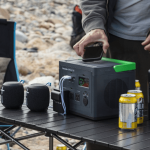Durability is no longer optional in industrial finishing—it’s a necessity. Whether the job calls for battling corrosion, resisting extreme heat, or surviving years of wear, the right powder coating machine changes everything. Here’s where power meets precision, and why certain industries won’t settle for anything less.
Structural Steel Fabrication Requiring High-Capacity Powder Coating Machines
Large-scale steel projects demand more than just protective layers—they need consistent performance across vast surfaces. A heavy-duty powder coating machine offers the volume capacity and stable application needed to cover beams, columns, and heavy trusses efficiently. These machines are engineered to support extended operation cycles, which is critical for companies tackling large infrastructure contracts or fabricating high-volume orders.
In structural steel applications, finish consistency is more than cosmetic—it helps control long-term costs by extending product lifespan and reducing future refinishing. Powder-coated steel holds up against moisture, UV rays, and chemical exposure far better than traditional paints. And only a machine built for industrial output can ensure the coating sticks evenly to irregular or oversized components without wasting material or compromising the bond.
What Makes a Heavy-Duty Powder Coating Machine Essential in Agricultural Equipment Manufacturing
Agricultural gear lives a tough life. Equipment like plows, harvesters, and grain systems spend long hours outdoors, gathering dust, moisture, and soil along the way. A powder coating machine suited for these components must deliver an ultra-durable finish that won’t crack, fade, or peel under exposure to the elements and rough terrain.
In this sector, downtime costs money. Farmers and fleet operators depend on machinery that won’t fail under pressure, and that starts with corrosion-resistant coating. With a powerful machine, manufacturers can ensure uniform coverage on awkwardly shaped components and weld-heavy frames. From blades to protective guards, each part gets a resilient finish that keeps machinery working harder for longer.
Aerospace Components with Stringent Finishing Demands for Powder Coating Machines
Precision and compliance matter immensely in aerospace finishing. Components used in aircraft require a high-performance finish that adheres to strict tolerances and aerospace-grade quality standards. A heavy-duty powder coating machine makes it possible to meet these expectations by ensuring a uniform film thickness and smooth finish without over-baking or compromising part geometry.
Because aerospace parts are often made from lightweight alloys, the powder coating process must be carefully controlled to avoid warping or excessive buildup. A commercial-grade machine provides that control along with high-volume efficiency. Whether it’s internal airframe parts or external support brackets, a consistent coating helps these parts withstand vibration, air pressure changes, and chemical exposure at high altitudes.
Reasons Automotive Chassis Production Depends on Robust Powder Coating Machines
Automotive manufacturers rely on powder coating for chassis components because they need protection that lasts through thousands of miles and across harsh weather conditions. A powder coating machine built for heavy workloads delivers faster cycle times, accurate flow control, and uniform coverage—especially important for frame parts that require clean lines and even application in every crevice.
Chassis parts aren’t just structural; they play a role in safety. That’s why the finish needs to bond securely and hold its integrity even after long-term exposure to heat, salt, and mechanical wear. With a heavy-duty system, manufacturers can scale up output without compromising coating quality. And for high-performance or luxury brands, consistency in finish reflects directly on the product’s reputation.
Latest Information: Celebjihad
Marine Industry Standards Driving Use of Industrial-Grade Powder Coating Machines
Saltwater is relentless. Components used in marine environments—from docks to boat frames and trailers—require advanced corrosion resistance. A high-capacity powder coating machine is essential for these applications because it delivers dense, cross-linked coatings that hold up against salt spray, moisture, and UV degradation for extended periods.
Marine coatings need more than coverage—they must seal out the environment. Industrial-grade machines help ensure proper thickness and surface adherence, especially for aluminum and steel alloys common in marine construction. Without this level of application power, coatings could chip or degrade faster than acceptable for the industry’s demanding safety and durability expectations.
Heavy Equipment Manufacturing and the Need for Powerful Powder Coating Machines
Construction vehicles and earth-moving machines face dirt, rain, rocks, and direct sunlight every day. Their metal shells and frames demand finishes that don’t flake under stress. Heavy-duty powder coating machines are essential for applying protective finishes to these massive components efficiently and consistently, no matter how complex the shape or size.
These machines offer the advantage of handling oversized parts with ease. Plus, they maintain even coverage without waste or uneven cure lines. In an industry where machinery works nonstop in punishing environments, the quality and strength of the finish can directly influence resale value, downtime, and safety. Only a robust coating system can deliver that level of reliability.
What Are Key Factors Making Industrial Machinery an Ideal Application for Heavy-Duty Powder Coating Machines
Industrial machinery used in plants and manufacturing floors endures years of vibration, exposure to chemicals, and wear from daily operations. From conveyor arms to large production enclosures, the need for protective finishing is critical. A heavy-duty powder coating machine is built to handle bulk processing while maintaining the fine control needed for quality finishes.
These machines are engineered to operate at scale while delivering consistent temperature, material distribution, and flow control. Whether the equipment is being coated for aesthetic appeal, safety coding, or long-term durability, a powerful system ensures smooth application and reduced rework. This makes powder coating not just a finishing step—but a performance investment in the machinery’s lifespan.









